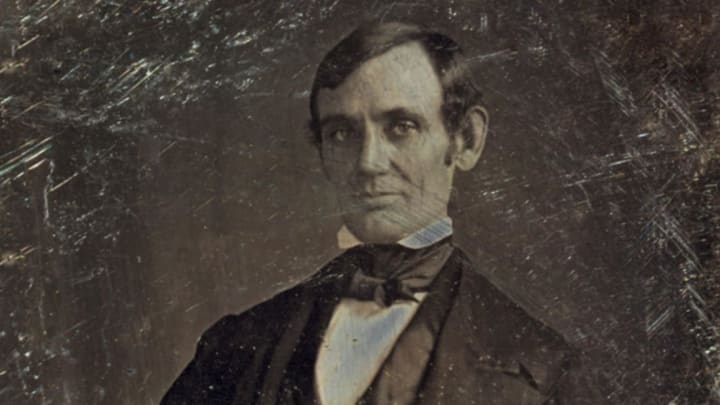Courtship can be messy, even for future presidents. And while we often lament the loss of those days when youthful indiscretions were kept undocumented, the letters of the pre-technology era can offer a similarly cringeworthy window into the embarrassments of our forefathers. Case in point: Abraham Lincoln.
In 1838, the 29-year-old Illinois state representative went on a pseudo blind date set up by a “great friend” who fancied making him her brother-in-law. The date wasn’t entirely blind—Lincoln had seen the sister some years before, and was keen on this set-up as he perceived her to be “intelligent and agreeable, and saw no good objection to plodding life through hand in hand with her.”
But as often happens with matchmaking, things quickly went from great to uncomfortable when Mary Owens did not look as Abe had remembered her. His description is best read in its full form.
I knew she was oversize, but she now appeared a fair match for Falstaff. I knew she was called an “old maid,” and I felt no doubt of the truth of at least half of the appellation, but now, when I beheld her, I could not for my life avoid thinking of my mother; and this, not from withered features—for her skin was too full of fat to permit of its contracting into wrinkles—but from her want of teeth, weather-beaten appearance in general, and from a kind of notion that ran in my head that nothing could have commenced at the size of infancy and reached her present bulk in less than thirty five or forty years.
In other words, he was not pleased, but being the gent that he was (and yes, that’s up for argument), Lincoln did the proper thing and went through with his agreement to date and potentially marry a woman he now reasoned to be one “that no other man on earth would have.” In doing so, he tells his friend Mrs. Orville H. Browning—the wife of a fellow member of the Legislature—that he resolved to look for Mary’s positive attributes. He concluded that she had the finest face despite her weight. Plus, he writes, she was smart, which was a higher value trait.
Then things get very strange. In the letter, Lincoln writes that he went away, during which time he corresponded with Ms. Owens and in doing so felt even more resolved about her intellect and intentions. Lincoln then proposes, and the object of his disaffection? She declines. He asks again and again, confused at her answer, and finally gives up “mortified.”
He concedes to Mrs. Browning that he clearly never understood what Ms. Owens wanted and then, as any rebuffed suitor does, begins to consider the possibility that he’s “a little in love with her.”
Lincoln’s final thought on the matter is perhaps the best of all, and it’s one that Groucho Marx would appreciate: “I have now come to the conclusion never again to think of marrying, and for this reason—I can never be satisfied with anyone who would be blockhead enough to have me.”
Of Lincoln, Mary Owens later wrote, “I thought Mr. Lincoln was deficient in those little links which make up the chain of woman’s happiness—at least it was so in my case.” You can hardly blame her, as Lincoln’s strange letters to her during their courtship do seem to be a reflection of a conflicted man (to put it generously). Reportedly, when Mrs. Browning later asked the president if she could share the letter with a biographer, he denied permission because it was too full of truth. Ward Lamon agreed with the sentiment, and when he made the letter public in his 1872 biography of Lincoln, he said, “For many reasons the publication of this letter is an extremely painful duty.”
Lincoln would become engaged to 21-year-old Mary Ann Todd two years after his proposal to Ms. Owens, but his relationship troubles didn't quite end there. Lincoln broke off the engagement to Mary Todd at one point, saying he felt unworthy of her, but the pair reconciled in 1842 and were together until his death in 1865.
To read the entire letter confirming that Abraham Lincoln was kinda just the bad ex-boyfriend in a romantic comedy, hop over to Lapham’s Quarterly.
